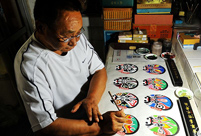 Happy life in Xinjiang
Happy life in Xinjiang
 2014 China Hainan Int'l Automotive Exhibition kicks off
2014 China Hainan Int'l Automotive Exhibition kicks off
 Collection of 'China Dream' public-spirited ads
Collection of 'China Dream' public-spirited ads
 The silent holy stones
The silent holy stones
 University students take care of giant pandas
University students take care of giant pandas
 Leading lady a true legend
Leading lady a true legend
 China Pan-Asia Stone Expo held in Kunming
China Pan-Asia Stone Expo held in Kunming
 Taiwan woman marries into Kazak family, 100 sheep plus a flat as dowry
Taiwan woman marries into Kazak family, 100 sheep plus a flat as dowry
 College girls take graduation photos under water in Chongqing
College girls take graduation photos under water in Chongqing
 Cartoon: Xi and football
Cartoon: Xi and football
Hong Kong chief Leung Chun-ying has initiated the process of delivering on a pledge to have universal suffrage for the 2017 election of the chief executive.
The first step of that reform was taken on Tuesday when Leung submitted a report to the National People's Congress Standing Committee.
The NPC will decide whether to amend the Basic Law Annex at its next meeting, which is expected in late August.
"Today is a historic moment in the constitutional development of Hong Kong," Leung said at a news conference. He said the democratic development of Hong Kong will take big strides forward if the people put differences behind them in a rational and pragmatic manner.
He said the central government has always been promptly informed of Hong Kong people's aspirations - including those expressed in a demonstration on July 1 - but he reiterated that "we have to uphold the rule of law and act according to the law."
If the standing committee agrees to proceed with the reform, the Hong Kong government will put forth concrete options by year-end.
The reform requires the endorsement of two-thirds of the Legislative Council, and consent of the chief executive and the NPC Standing Committee.
Carrie Lam Cheng Yuet-ngor, chief secretary for administration, warned lawmakers that if political groups are unwilling to compromise and waste time on proposals that have little chance of being realized from legal and political perspectives, the city may miss the chance to implement universal suffrage in 2017.
The report said that the Hong Kong community generally agrees that the discussion on electoral reform should be made on the basis of the Basic Law and relevant interpretation and decisions of the NPCSC.
It said mainstream opinion in Hong Kong was that the power to nominate candidates for chief executive is only vested in the statutory nominating committee, as made clear in the Basic Law.
Elsie Leung, deputy director of the Hong Kong Special Administrative Region Basic Law Committee under the NPCSC, agreed with the administration's decision to not recommend an overhaul of the Legislative Council election.
The NPCSC decided in 2007 that universal suffrage for election of the chief executive is a pre-condition for that of the council. If the reform plan for 2017 fails, there will be no universal suffrage for the legislature in 2020, the former justice secretary pointed out.
Lau Siu-kai, vice-president of the Chinese Association on Hong Kong and Macao Studies, believes most Hong Kong people would not resort to confrontation to fight for "civil nomination" of chief executive candidates.
 Moms on their kid’s coming out
Moms on their kid’s coming out Chinese fighters through lens
Chinese fighters through lens
 Children attend gymnastics training in summer
Children attend gymnastics training in summer
 Beautiful sceneries along the special travel route in Xinjiang
Beautiful sceneries along the special travel route in Xinjiang
 Beauty SWAT member in Xinjiang sparks online frenzy
Beauty SWAT member in Xinjiang sparks online frenzy
 Germany beat Argentina 1-0 to win World Cup
Germany beat Argentina 1-0 to win World Cup
 National fitness team members integrate traditional and modern beauty
National fitness team members integrate traditional and modern beauty Collection of 'China Dream' public-spirited ads
Collection of 'China Dream' public-spirited ads  How Chinese men kill the time when their wives practice square dancing?
How Chinese men kill the time when their wives practice square dancing? China's largest 3D printer builds 2-meter-long boat
China's largest 3D printer builds 2-meter-long boat
 One-legged women with high heel goes viral on Internet
One-legged women with high heel goes viral on Internet Photos of the Week
(July 6 - July 12)
Photos of the Week
(July 6 - July 12)
 'Super moon' seen in Beijing
'Super moon' seen in Beijing
 Happy life in Xinjiang
Happy life in Xinjiang
 'Finding Nemo' in Seattle Aquarium
'Finding Nemo' in Seattle AquariumDay|Week|Month